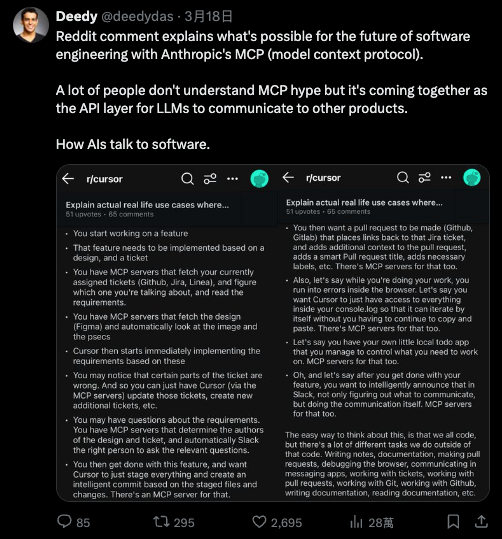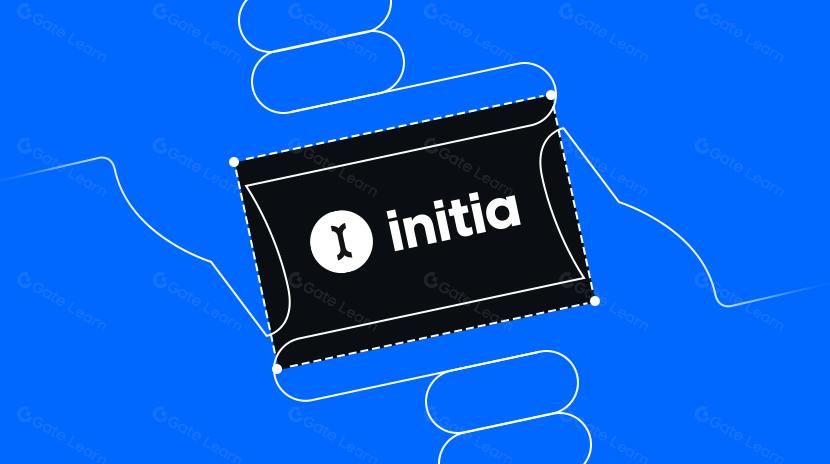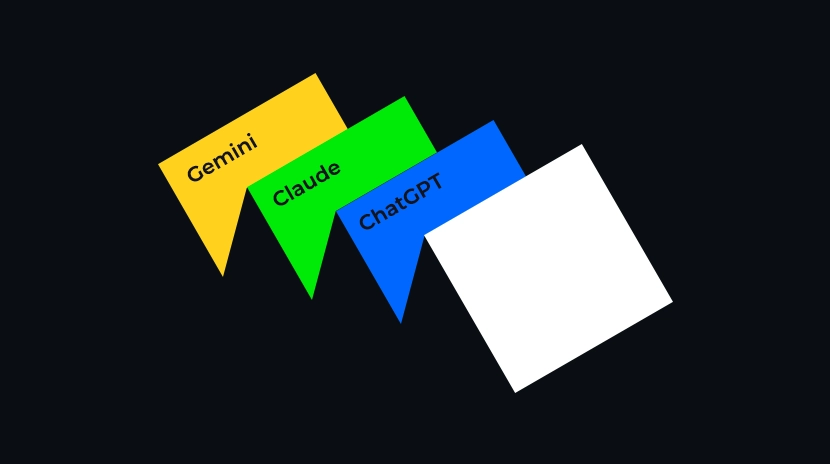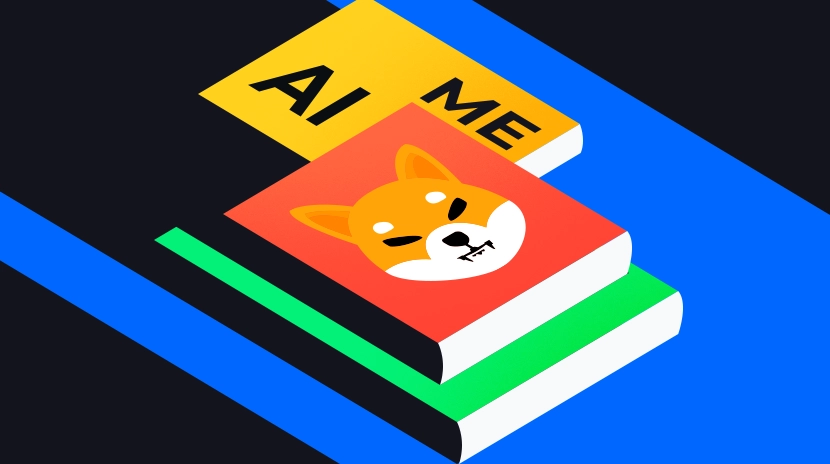MCP: Conectando a IA e o Mundo Real
Encaminhar o Título Original 'Model Context Protocol (MCP): O Próximo Catalisador de IA Crypto'
Se és como eu, provavelmente tens estado a perguntar-te 'WTF é MCP?!' ... e por que é que tanta gente está a falar sobre isso?
Há pouca literatura sobre isso, e com razão; foi apenas concebido há quatro meses atrás. Por isso, decidi pesquisar e consolidar as minhas descobertas aqui.
TLDR: É uma grande desbloqueio para criptomoedas e inteligência artificial de código aberto. Portanto, você precisa prestar atenção; poderia catalisar a próxima etapa nos produtos criptográficos agentes.
Conteúdos
- Introdução
- O que é o Protocolo de Contexto do Modelo?
- Como o MCP funciona para agentes de IA
- O Futuro Agente: Porque o MCP é Importante
- Outras Iniciativas Semelhantes ao MC
- Principais diferenciadores das integrações de IA tradicionais
- Conclusão
1) Introdução
À medida que os agentes de IA evoluem para se tornarem mais autônomos e integrados em aplicações do mundo real, o Protocolo de Contexto do Modelo ("MCP") surgiu como um agente de mudança na forma como esses agentes interagem com dados e ferramentas externas.
Lançada pela Anthropic no final de 2024, MCP está se posicionando como um quadro padronizado para capacitar agentes de IA, permitindo comunicação perfeita com diversas fontes de dados.

Mas desde@anthropicaiintroduziu este padrão de comunicação, mais soluções de IA adotaram isso como o status quo
Simplesmente, é: "Como os IA's falam com o software" em tempo real

Com o futuro agente no horizonte—onde os sistemas de IA agem de forma independente para resolver tarefas complexas—poderá a MCP ser a chave para desbloquear a próxima onda de inovação em IA?
Talvez a próxima subida em termos de ação de preço de Crypto x AI?
Dos chatbots aos sistemas autônomos que impulsionam as indústrias, os agentes de IA estão cada vez mais sendo esperados para tomar decisões em tempo real, baseando-se em dados ao vivo de uma variedade de fontes.
No entanto, um grande obstáculo persistiu: a falta de uma forma padronizada para que os modelos de IA se conectem a sistemas externos, como bancos de dados, repositórios de arquivos ou ferramentas de negócios.
Aqui é onde o MCP se encaixa.
Introduza o Protocolo de Contexto do Modelo (MCP) - um padrão aberto projetado para preencher esta lacuna, permitindo que agentes de IA acessem e interajam dinamicamente com fontes de dados externas.
Permite que os Modelos de Linguagem Grande (LLMs) atuem eficazmente como Agentes, com a capacidade de implementar contratos inteligentes ou realizar atividades DeFi. Isso é um desbloqueio bastante grande!
Se já usou o ChatGPT como um nativo de criptomoeda, provavelmente está ciente de que é terrível em fornecer informações específicas ou análises oportunas sobre criptomoedas - ficaria surpreso se até conseguisse me dizer o preço atual de algumas das 100 principais criptomoedas!
MCPs oferecem a capacidade de aprimorar DeFi alimentado por IA, como:
- Encontre a melhor APY para USDC e aloque $1K, ou;
- Reequilibrar carteiras com base na volatilidade do mercado.
Este sinaliza um movimento mais amplo em direção a um futuro agente em que os sistemas de IA operam com maior independência e utilidade.
Algo que diferencia os sistemas de IA tradicionais da natureza sem permissão dos trilhos de cripto.
2) Qual é o Protocolo de Contexto do Modelo?
O Protocolo de Contexto do Modelo ("MCP"), introduzido pela Anthropic no final de 2024, é um padrão de código aberto projetado para conectar assistentes de IA
Particularmente agentes de IA alimentados por grandes modelos de linguagem (LLMs)—para sistemas externos onde esses suculentos dados em tempo real residem.

Pense nisso como um adaptador universal que permite que agentes de IA se conectem (de forma segura e padronizada):
- Repositórios de conteúdo
- Ferramentas de negócios
- Ambientes de desenvolvimento e muito mais!
Por que deveria importar-se?
Ao contrário das integrações de IA tradicionais, que frequentemente dependem de soluções fragmentadas e personalizadas, o MC fornece um quadro unificado para comunicação bidirecional.
Isto significa que os agentes de IA não só podem recolher dados de fontes externas, mas também enviar atualizações ou ações de volta para esses sistemas, permitindo um comportamento mais dinâmico e autônomo.
Poderia ter um agente a atualizar sistemas empresariais ou a gerir os seus assuntos pessoais totalmente autonomamente!
A missão da Anthropic com o MCP é simplificar a integração de IA, tornando mais fácil para os desenvolvedores construir fluxos de trabalho agentes onde os sistemas de IA podem operar de forma independente e contextual.
3) Como a MCP funciona para agentes de IA
O MCP atua como uma camada de integração que permite que agentes de IA se conectem a serviços externos sob demanda. Aqui está uma explicação de como ele funciona:

a) Acesso Dinâmico aos Dados:
Em vez de depender apenas de dados pré-treinados, os agentes de IA que usam o MCP podem aceder a dados em tempo real ou específicos do contexto de fontes como bases de dados relacionais, sistemas de ficheiros ou repositórios de código.
Esses preços exóticos de criptomoedas podem ser acessados em tempo real! Mesmo@0rxbtestá a brincar com um MC para o nosso favorito Purple Frog, também conhecido como SkyNet, também conhecido como @aixbt_agent:

b) Comunicação Bidirecional:
MCP permite interações bidirecionais, o que significa que os agentes de IA podem tanto recuperar dados quanto tomar medidas - como atualizar um banco de dados ou acionar um fluxo de trabalho - com base em sua análise.
c) Estrutura Padronizada:
Ao fornecer um protocolo universal, o MCP elimina a necessidade de integrações personalizadas, reduzindo a complexidade para os desenvolvedores e garantindo consistência em todas as aplicações.
Talvez esta seja a solução para todas as diferentes blockchains e variedade de linguagens de programação! Talvez os agentes se tornem a camada de agregação?!
4) O Futuro Agente: Porque MCP é Importante
Os agentes de IA já não são apenas sistemas reativos; estão a tornar-se entidades proativas, orientadas para objetivos, capazes de tomar decisões autonomamente.
No entanto, para que os agentes de IA sejam realmente úteis, eles precisam libertar-se das limitações dos seus dados de treino e interagirem de forma fluida com o mundo real.
É aqui que entra o MCP.
Um ótimo exemplo de MC em ação vem da própria documentação da Anthropic:
Imagine um agente de IA encarregado de gerir um pipeline de desenvolvimento de software.
Usando MCP, o agente pode:
- Obter o código mais recente de um repositório
- Analise-o em busca de bugs e
- em seguida, envie um relatório de volta para a ferramenta de gestão de projetos da equipa—tudo em tempo real.
Abaixo (h/t@alexalbert__ ) podemos ver o Claude da Anthropic conectando diretamente ao GitHub, criando um novo repositório e faz um PR usando sua integração MCP:

MCP permite que agentes de IA se adaptem a contextos em mudança, acedendo a dados em tempo real, tornando-os mais responsivos e inteligentes.
Abaixo demonstra a sua integração e comunicação com GitHub, Web APIs, Slack, Emails e muito mais.

A MCP fornece uma solução para@davidsacksdeclaração sobre como pode parecer o agente "The Winning":

Mas talvez seja a infraestrutura que conecta os agentes ao mundo real a fórmula vencedora!
Com um protocolo padronizado, os desenvolvedores podem construir fluxos de trabalho agentes mais rapidamente, sem reinventar a roda para cada nova integração.
O futuro agente é tudo sobre sistemas de IA que podem agir de forma independente para alcançar objetivos complexos - seja isso:
- Automatização de processos de negócios,
- Gerir cadeias de abastecimento, ou
- Mesmo ajudando na pesquisa científica.
MCP é um passo crítico para tornar esta visão uma realidade, fornecendo a infraestrutura para os agentes de IA interagirem com o mundo de forma significativa.
5) Outras Iniciativas Semelhantes ao MCP
A Antropia não é a única a reconhecer a necessidade de protocolos de integração de IA padronizados.
Vários grandes protocolos e empresas lançaram ou adotaram recentemente frameworks semelhantes ao MCP para apoiar o futuro agente:
i) Perplexidade MCP:

ii) OpenAI Agents SDK MCP:
Mais recentemente (ontem, de facto) a OpenAI lançou o seu próprio plugin MCP para o seu SDK de Agentes:

iii) Integração Stripe MCP:

...e muitos mais servidores MC estão a ser desenvolvidos para tornar a comunicação de IA mais fluida:

Os CEOs, separados da Anthropic, estão reconhecendo a sua importância na progressão do futuro do Agente de IA:

Estas iniciativas destacam uma tendência crescente: o reconhecimento de que a IA agente requer soluções padronizadas e escaláveis para integração de dados.
Embora a MCP continue a ser líder devido à sua natureza de código aberto e ampla aplicabilidade, o envolvimento de grandes players como xAI, Google e Meta sublinha a importância deste espaço.
6) Diferenciais-chave das Integrações Tradicionais de IA
Por que é que MCP (e os seus homólogos) se destacam em comparação com as integrações tradicionais de IA?
As integrações tradicionais geralmente envolvem APIs ou middleware personalizados, levando a soluções fragmentadas que são difíceis de escalar.
A MCP oferece um padrão universal, reduzindo a complexidade e garantindo consistência. Este diagrama de comparação acerta em cheio numa única imagem:

Colaboração de Código Aberto: A natureza de código aberto da MC promove a colaboração em toda a indústria, contrastando com as abordagens isoladas das empresas de IA centralizadas.
ESTA É UMA GRANDE PROPOSTA DE VALOR PARA CRIPTOMOEDAS.
Aqui está uma rápida comparação:

Aqui estão alguns exemplos de alto nível de como pode ser usado em criptografia:

Estamos começando a ver um impulso com (1) com soluções DeFAI, por exemplo @danielesesta ‘s @heyanonai @LimitusIntelou @gizatechxyz, e a análise on-chain também está a ser abordada com ferramentas personalizadas como@aixbt_agent
Espera-se que haja muito mais a chegar à medida que o MCP é integrado ainda mais nos ecossistemas mais amplos de criptomoeda e IA!
7) Conclusão
MCP representa um passo fundamental rumo a um futuro de IA agente, onde sistemas autônomos podem interagir perfeitamente com o mundo que os rodeia.
Ao fornecer um quadro padronizado para conectar agentes de IA a fontes de dados externas, o MCP aborda um gargalo crítico no desenvolvimento de IA, permitindo soluções mais inteligentes, adaptáveis e escaláveis.
A adoção mais ampla da indústria de protocolos semelhantes ao MCP sinaliza um impulso coletivo em direção a esta visão agente.
No entanto, permanecem desafios.
O sucesso da MCP e seus concorrentes dependerá da adoção generalizada, da interoperabilidade entre protocolos e da capacidade de acompanhar o cenário de IA em rápida evolução.
À medida que avançamos para um futuro onde agentes de IA desempenham um papel cada vez mais central em nossas vidas, estruturas como o MCP serão as pontes que conectam a IA a aplicações do mundo real.
Se o MCP se torna o padrão de fato ou simplesmente um catalisador para mais inovação, ele já desencadeou uma conversa crucial sobre a infraestrutura necessária para IA agentica e produtos criptográficos agenticos.
Aviso legal:
- Este artigo foi reproduzido a partir de [s4mmyEncaminhe o Título Original 'Model Context Protocol (MCP): O Próximo Catalisador de IA Cripto'. Todos os direitos autorais pertencem ao autor originals4mmy]. Se houver objeções a esta reimpressão, entre em contato com oGate Learnequipa e eles vão lidar com isso prontamente.
- Responsabilidade de Isenção: As opiniões expressas neste artigo são exclusivamente do autor e não constituem qualquer conselho de investimento.
- A equipe do Gate Learn faz traduções do artigo para outras línguas. Copiar, distribuir ou plagiar os artigos traduzidos é proibido, a menos que seja mencionado.
Artigos relacionados

O que são Narrativas Cripto? Principais Narrativas para 2025 (ATUALIZADO)

Explorando o Smart Agent Hub: Sonic SVM e seu Framework de Escalonamento HyperGrid

Initia: Pilha Entrelaçada e Blockchain Modular

Como os Agentes de IA Impulsionarão a Cripto no Mercado Principal

Qual plataforma constrói os melhores agentes de IA? Testamos o ChatGPT, Claude, Gemini e outros


